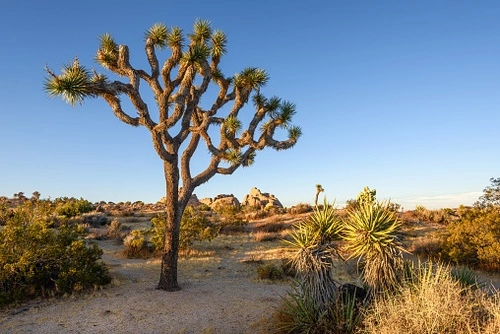
On May 12, 2025, the U.S. District Court for the Central District of California ordered the U.S. Fish & Wildlife Service (Service) to reevaluate its decision not to list two species of Joshua tree—Yucca brevifolia (western Joshua tree) and Yucca jaegeriana (eastern Joshua tree)—as “threatened” under the federal Endangered Species Act (ESA). The district court issued a judgment in the case on July 7, 2025. The federal government has 60 days from the date of judgment to decide whether to appeal the district court’s decision.
The case stems from WildEarth Guardian’s ongoing efforts to secure federal protection for the Joshua tree. In 2015, the group submitted a petition to list the species, prompting litigation that led to a district court order requiring the Service to reconsider. In 2023, the Service again concluded that listing was unwarranted, resulting in the current lawsuit.
The district court’s decision focused on the Service’s finding that Joshua trees are not likely to become threatened in the foreseeable future. According to the court, the Service failed to demonstrate that its conclusion was based on the best available science. While the Service concluded that predictions regarding (i) the anticipated effects of climate change on the Joshua tree’s habitat and (ii) the response of the species to those effects at the end of the century and beyond are uncertain and do not provide a reliable basis to list the species, the court opined that such uncertainty does not justify the agency’s decision.
The district court likewise rejected the Service’s determination that Joshua trees are not likely to become threatened across a significant portion of its range. In rejecting the agency’s position that a reduction in the quality of habitat for the species across a portion of its range is not a basis for listing it as threatened, the court opined that the Service failed to conform to its policy of “institutionalized caution.”
The issues raised in this case—the meaning of “foreseeable future” and “significant portion of its range,” as well as a court-mandated requirement for the agency to exercise “institutionalized caution”—are likely to recur in other ESA cases in the coming years.
NOTE: Nossaman filed an amicus brief for QuadState Local Governments Authority in the matter.
- Partner
Paul Weiland is Assistant Managing Partner and a member of the Environment & Land Use Group. He has represented clients – including public agencies, publicly regulated utilities, corporations, trade associations and ...
Nossaman’s Endangered Species Law & Policy blog focuses on news, events, and policies affecting endangered species issues in California and throughout the United States. Topics include listing and critical habitat decisions, conservation and recovery planning, inter-agency consultation, and related developments in law, policy, and science. We also inform readers about regulatory and legislative developments, as well as key court decisions.
Stay Connected
 RSS Feed
RSS Feed
Categories
- Alternative Energy
- Bald and Golden Eagle Protection Act
- Budget
- CEQA
- CESA
- Climate Change
- Congress
- Conservation
- Construction Projects
- Consultation
- Continuing Education
- Court Decisions
- Critical Habitat
- Delisting
- Endangered Species Act
- Event
- Fish & Wildlife Service
- Freedom of Information Act
- Government Administration
- Legal
- Legislation
- Listing
- Litigation
- Migratory Bird
- National Marine Fisheries Service
- NEPA
- Off Shore Wind
- Pacific Northwest
- project
- Publications
- Regulatory Reform
- Sacramento-San Joaquin Delta
- SEPA
- Speaking Engagements
- Supreme Court
- Texas
- Timberland
- Water Issues

